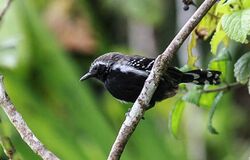Biology:Formicivora
| Formicivora | |
|---|---|

| |
| Southern white-fringed antwren (Formicivora grisea) | |
| Scientific classification | |
| Domain: | Eukaryota |
| Kingdom: | Animalia |
| Phylum: | Chordata |
| Class: | Aves |
| Order: | Passeriformes |
| Family: | Thamnophilidae |
| Genus: | Formicivora Swainson, 1824 |
| Type species | |
| Formicivora nigricollis[1] Swainson, 1825
| |
| Species | |
|
see text. | |
Formicivora is a genus of insectivorous birds in the antbird family, Thamnophilidae. These relatively small, long-tailed antbirds are strongly sexually dichromatic. They are found in semi-open habitats in woodland and shrub in South America. They have several rows of white spots on the wings. Males are usually darker below than they are above, and sometimes have a fringe of white on the side.
The genus Formicivora was introduced by the English naturalist William Swainson in 1824.[2][3] The type species is the southern white-fringed antwren.[4] The name of the genus Formicivora combines the Latin words formica for "ant" and -vorus "eating" from vorare "to devour".[5]
The Sincorá antwren was first described in 2007.[6] While initially placed in its own genus Stymphalornis, the marsh antwren belongs in Formicivora.[7] In contrast, the black-hooded antwren is not closely related to other Formicivora and may be better placed in its own genus.[7]
There are nine species:[8]
- Narrow-billed antwren, Formicivora iheringi
- Black-hooded antwren, Formicivora erythronotos
- Southern white-fringed antwren, Formicivora grisea
- Northern white-fringed antwren, Formicivora intermedia
- Serra antwren, Formicivora serrana
- Black-bellied antwren, Formicivora melanogaster
- Rusty-backed antwren, Formicivora rufa
- Sincorá antwren, Formicivora grantsaui
- Marsh antwren, Formicivora acutirostris
References
- ↑ "Thamnophilidae". The Trust for Avian Systematics. https://www.aviansystematics.org/4th-edition-checklist?viewfamilies=108.
- ↑ Swainson, William John (1824). "An inquiry into the natural affinities of the Laniadae, or shrikes; preceded by some observations on the present state of ornithology in this country". Zoological Journal 1: 289–307 [301]. https://biodiversitylibrary.org/page/27571028.
- ↑ Swainson, William John (1825). "On two new genera of birds, Formicivora and Drymophila, with descriptions of several species". Zoological Journal 2: 145–154 [145–149]. https://biodiversitylibrary.org/page/27490489.
- ↑ Peters, James Lee, ed (1951). Check-list of Birds of the World. 7. Cambridge, Massachusetts: Museum of Comparative Zoology. p. 206. https://biodiversitylibrary.org/page/14480543.
- ↑ Jobling, James A. (2010). The Helm Dictionary of Scientific Bird Names. London: Christopher Helm. p. 163. ISBN 978-1-4081-2501-4. https://archive.org/details/Helm_Dictionary_of_Scientific_Bird_Names_by_James_A._Jobling.
- ↑ Gonzaga, L.P.; Carvalhaes, A.M.P.; Buzzetti, D.R.C. (2007). "A new species of Formicivora antwren from the Chapada Diamantina, eastern Brazil (Aves: Passeriformes: Thamnophilidae)". Zootaxa 1473: 25–38. doi:10.11646/zootaxa.1473.1.2. http://www.planetofbirds.com/ns/Sincora%20Antwren.pdf.
- ↑ 7.0 7.1 Buzzetti, D.R.C.; Belmonte-Lopes, R.; Reinert, B.L.; Silveira, L.F.; Bornschein, M.R. (2013). "A new species of Formicivora Swainson, 1824 (Thamnophilidae) from the state of São Paulo, Brazil". Revista Brasileira de Ornitologia 21 (4): 269–291. http://www4.museu-goeldi.br/revistabrornito/revista/index.php/BJO/article/viewFile/5409/pdf_860.
- ↑ Gill, Frank; Donsker, David, eds (2018). "Antbirds". World Bird List Version 8.1. International Ornithologists' Union. http://www.worldbirdnames.org/bow/antbirds/.
Wikidata ☰ Q934716 entry
 |

